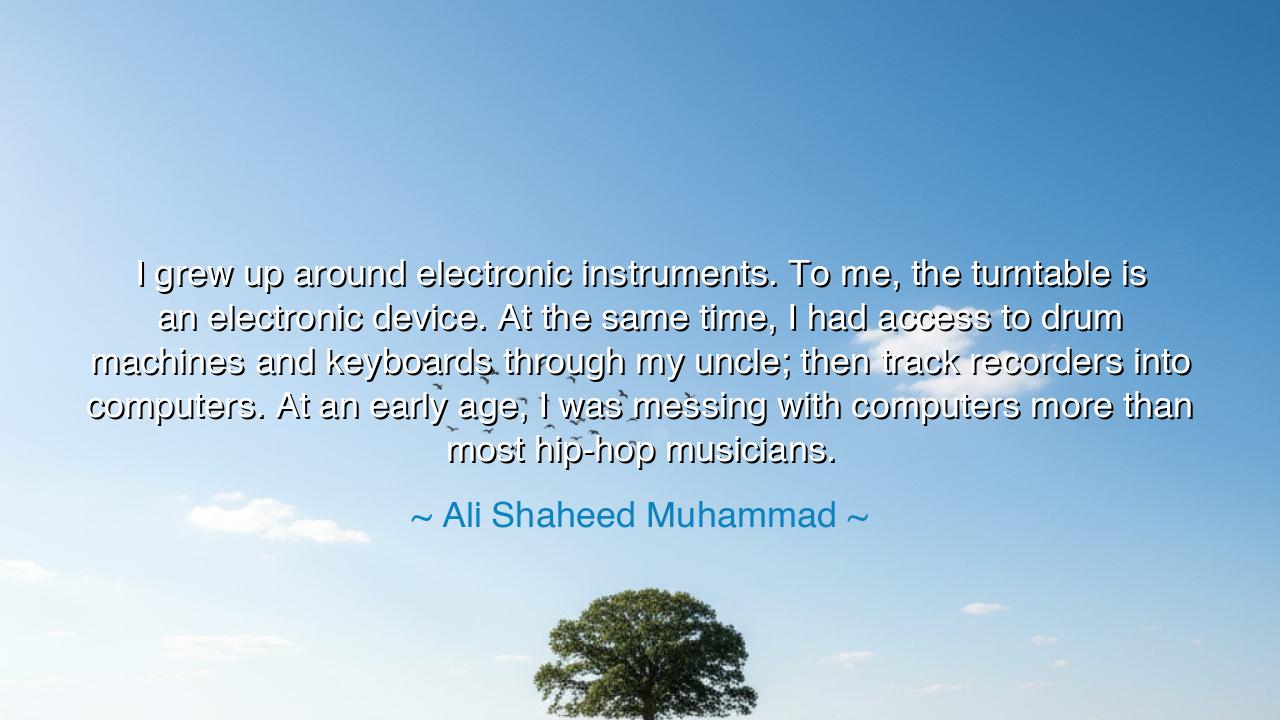
I grew up around electronic instruments. To me, the turntable is
I grew up around electronic instruments. To me, the turntable is an electronic device. At the same time, I had access to drum machines and keyboards through my uncle; then track recorders into computers. At an early age, I was messing with computers more than most hip-hop musicians.






In the words of Ali Shaheed Muhammad, artist and craftsman of rhythm, there resounds both reverence and revelation: “I grew up around electronic instruments. To me, the turntable is an electronic device. At the same time, I had access to drum machines and keyboards through my uncle; then track recorders into computers. At an early age, I was messing with computers more than most hip-hop musicians.” This is not a mere recollection of childhood—it is a testament to origin, to the birth of creativity in the age of circuitry and sound. In these words lies the spirit of a generation that bridged the ancient pulse of music with the new language of technology, forging from it something both human and eternal.
In the time before such tools were common, music was carved from breath and hand—flutes of bone, drums of skin, strings of gut and wood. Yet as the centuries turned, new instruments arose—electronic instruments, born not of forests or fields, but of electricity and code. Many feared them, calling them artificial, soulless, as if the spirit of music could not dwell within a machine. But Muhammad, like the great innovators before him, saw what others could not: that technology itself could become an instrument of the heart. The turntable, to him, was not a device of playback but a weapon of creation, a tool through which rhythm could be reshaped, time itself remixed.
He speaks, too, of inheritance—of the wisdom passed down from his uncle, who placed in his hands the drum machines, the keyboards, and later the computers that would shape his destiny. Here we see the sacred thread of mentorship, as old as civilization itself. Just as ancient scribes taught their apprentices the mysteries of ink and parchment, Muhammad was taught to command the flow of electronic sound. The ancients said: “Every generation inherits the tools of its age, but only the wise learn to turn them into art.” In this, Muhammad became not just a student of technology, but a priest of rhythm, merging the old traditions of hip-hop’s storytelling with the boundless potential of digital creation.
In the story of his early mastery—of “messing with computers more than most hip-hop musicians”—there lies a parable of curiosity. The youth who dares to explore beyond the familiar becomes the bridge between worlds. Muhammad did not see machines as alien to music, but as companions. Like Leonardo da Vinci sketching flying machines while studying anatomy, he moved fluidly between the mechanical and the soulful, between the beat and the byte. His curiosity became his compass, guiding him to help form A Tribe Called Quest, whose fusion of jazz, funk, and technology reshaped the very foundation of hip-hop.
The deeper meaning of his words is this: innovation is born not from rejecting the past, but from weaving it with the future. The turntable, the drum machine, the computer—each is a descendant of the same ancient desire: to capture rhythm, to express the inexpressible, to turn life into sound. When Muhammad speaks of his early experiments, he reminds us that greatness does not wait for permission—it is forged in the restless hands of those who tinker, who explore, who see possibilities where others see boundaries. To the untrained ear, he was “messing around.” To the wise, he was laying the groundwork for a new form of art.
His journey mirrors the great transformations of every age. When the painter first touched pigment to cave wall, when the monk first pressed ink to parchment, when the inventor first harnessed electricity, the world expanded. Each act of creation—whether with brush, pen, or code—springs from the same divine spark. So too does Muhammad’s story remind us that art and technology are not opposites, but partners in evolution. To make music from machines is to affirm that even in the digital, the human heart still beats.
The lesson, then, is one of openness and courage. Embrace the tools of your time, yet never forget the soul within them. Let your curiosity lead you to mastery; let your mastery serve something greater than yourself. As Muhammad found harmony between man and machine, so must each of us learn to balance tradition and innovation, heritage and invention. For it is not the instrument that defines the artist—it is the spirit that plays it.
And so, children of rhythm and light, remember the teaching of Ali Shaheed Muhammad: do not fear the new, nor discard the old. Combine them. Create with reverence and rebellion alike. For the world’s next great symphony may not come from strings or brass, but from the humming circuits of a computer—and the soul of one who dares to make it sing.






AAdministratorAdministrator
Welcome, honored guests. Please leave a comment, we will respond soon